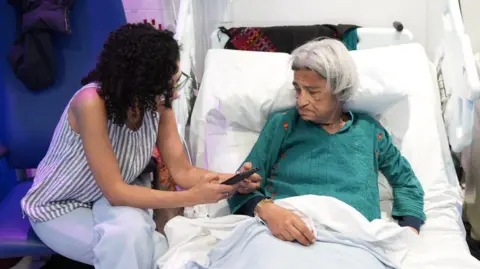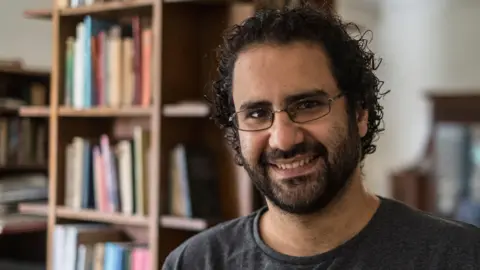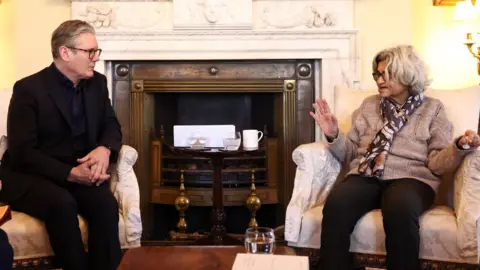
Laila Soueif’s daughter, Sanaa, described the situation as “very scary”
Laila Soueif’s body is becoming weaker and weaker.
Doctors have warned her that - after eight months on hunger strike - she’s now at risk of sudden death.
But the strength of her resolve has not diminished at all.
Speaking to the BBC from St Thomas’ hospital in London, the 69-year-old British-Egyptian maths professor says that she “passionately” wants to live.
But she told the Today programme that she was prepared to die if that was what it took to get her son Alaa Abdel Fattah - Egypt’s most prominent political prisoner - out of jail in Cairo.
Calling on UK Prime Minister Sir Keir Starmer and his government to find a way to get Egypt to release him, she says she believes she has “no other choice” but to continue to refuse calories.
Alaa Abdel Fattah - who is also a British-Egyptian dual national - played a prominent role in pro-democracy protests in Egypt in 2011 and has been in prison almost continuously since 2014.
His latest five-year sentence was imposed after he shared a Facebook post about a prisoner dying after torture.
Laila Soueif went on hunger strike in September 2024 - when her son’s sentence should have ended.
The Egyptian authorities refused to count the more than two years he spent in pre-trial detention towards his time served. And his family fear he is being used to set an example, and will never be freed.
“He finished his sentence for God’s sake. It was an unfair sentence rendered by a kangaroo court,” his mother says. “He should have been out of that jail on 29 September.”
For months, she consumed only herbal tea, black coffee and rehydration salts. Hospitalised in February, she agreed to consume 300 liquid calories a day, after the prime minister called on Egypt’s President Abdul Fattah al-Sisi to free her son.
But on 20 May, she resumed her full hunger strike, saying that no progress had been made.
Laila Soueif was hospitalised last Thursday and given glucagon, a hormone used to treat severe hypoglycaemia.
She’s taking intravenous electrolytes. But she’s currently refusing glucose treatment. And over the weekend, her glucose levels dropped so low that they couldn’t be detected, according to her family.

Alaa Abdel Fattah, seen here in 2019, has spent most of the past 11 years in prison
“No-one understands how she’s still conscious,” her daughter, Sanaa Seif, told me. “It’s very scary.”
She says that her mother now feels like she’s dying.
“She’s talking to us about life after she’s gone. She’s started to do her farewells.”
Last week, the UN Working Group on Arbitrary Detention - a panel of independent human rights - said Alaa Abdel Fattah had been arrested for exercising his right to freedom of expression and called for his immediate release.
But Egypt - an important ally of the UK - has not even allowed the British embassy to visit him.
Appeals from his family for the UK government to do more to put pressure on Egypt have been joined by MPs from the All Party Parliamentary Group on Arbitrary Detention and Hostage Affairs and by the former British ambassador to Egypt, John Casson.

British Prime Minister Sir Keir Starmer has told Laila Souief that he is pressing Egypt to release her son
While in opposition, the Foreign Secretary, David Lammy, had called for Egypt to face “serious diplomatic consequences” if it did not grant the UK immediate consular access, and free Alaa Abdel Fattah.
“I don’t think the government is being forceful enough,” Sanaa Seif says. “Alaa needs to be out of prison and out of the country. He needs to be in Brighton with his son, Khaled.”
She says she is inspired by her mother’s strength and pleased that her hunger strike has drawn attention to the plight of the tens of thousands of political prisoners estimated to be held in Egypt - as well as the problems that British nationals face when detained abroad.
“I’m really, really proud of my mum. I’m scared for her. And I’m angry at the government, especially the Foreign Office, because they’ve wasted so much time.”
The Foreign Office says it is committed to securing Alaa Abdel Fattah’s release.
“The foreign secretary stressed the urgency of the situation in a call with his counterpart on Sunday morning, and further engagement at the highest levels of the Egyptian government continues,” a spokesperson said.
Officials say the prime minister spoke to President Sisi on 22 May and again pressed for his release.
Asked what her message would be if she didn’t survive, Laila Soueif replied: “My message is: use my death as leverage to get Alaa out.”
She added: “Don’t let my death be in vain.”